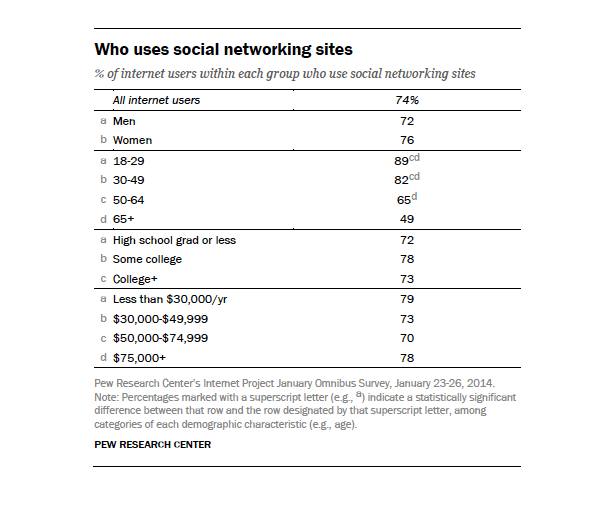Read the three statuses below and think of three different scenarios where the original status listed could be interpreted to mean something different. For example, if the status update was, "Goodbye,
Module 2 Lesson Content
Reading - Sassenberg, K. (2013). It Is About the Web and the User: The Effects of Web Use Depend on Person Characteristics. Psychological Inquiry, 24(4), 333-340.
Social Media and Behavior
Now we're going to learn more about psychological theories and how they relate to social media. We'll start thinking about how social media influences us, both privately (like your Instagram account) and professionally (your LinkedIn profile or your company's Facebook page.) We will talk about how social media impacts our socialization with others, our learning, and our biases.
It's important to start with the basics. As we already know, social media affects our lives. A 2010 Pew Research Center Study (https://www.pewinternet.org/2011/06/16/social-networking-sites-and-our-lives/) found:
Social networking sites are increasingly used to keep up with close social ties.
The average user of a social networking site has more close ties and is half as likely to be socially isolated as the average American.
Facebook users are more trusting than non-Facebook users.
Facebook users have more close relationships.
Internet users get more support from their social ties. In conjunction, Facebook users get the most support versus other social media platforms.
Facebook users are more politically engaged than most people.
Facebook revives "dormant" relationships.
MySpace users are more likely to be open to opposing points of view.
Now are people with these attributes drawn to the social media they use or do they develop these characteristics because of the social media they use? (Keep thinking about that as you read - it's a big piece of our discussion this week!)
Additional Resources
Infographic on psychology of social media (http://www.adweek.com/socialtimes/psychology-social-networking/467550)
Infographic on social media sharing (http://www.adweek.com/socialtimes/social-sharing-psychology/495270)
Social Media Statistics
We have talked a lot about various theories and the influence of social media on our thoughts, experiences, and perceptions. With social media having the potential to be such and influence in our lives, let's take a look at how many adults are using social networking sites.
The following data are based on January 2014 study conducted by the PEW Research Center.

If you want to explore this data in greater detail, visit the Pew Research Center website by clicking here.
Here's the infographic on social media sharing from this week's reading again as well: http://www.adweek.com/socialtimes/social-sharing-psychology/495270



